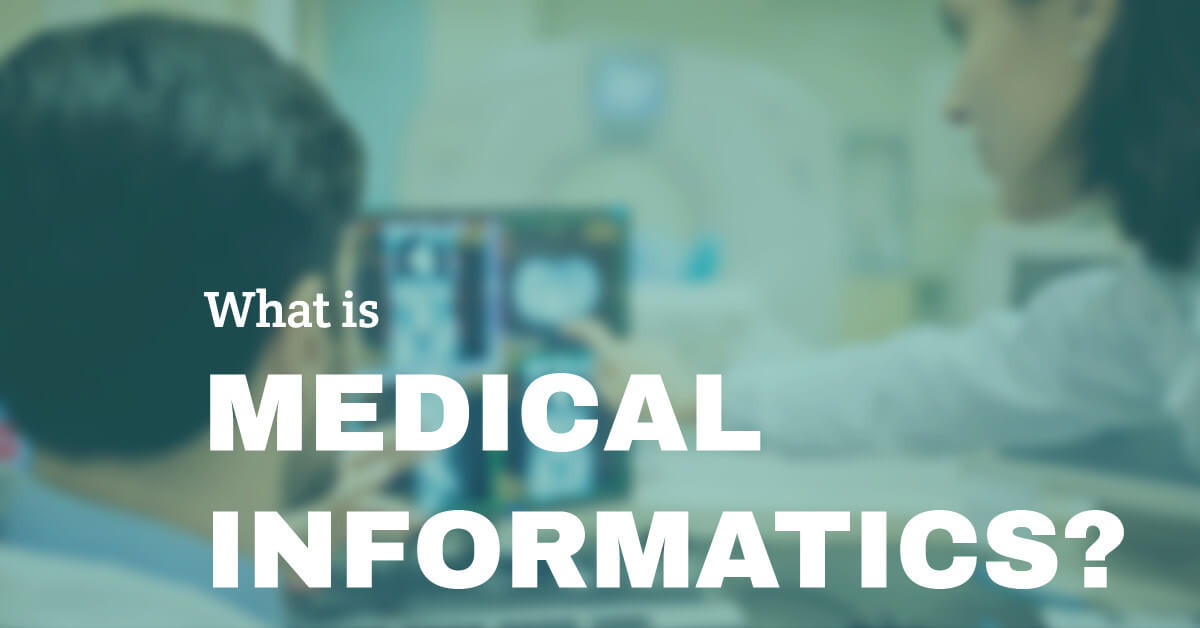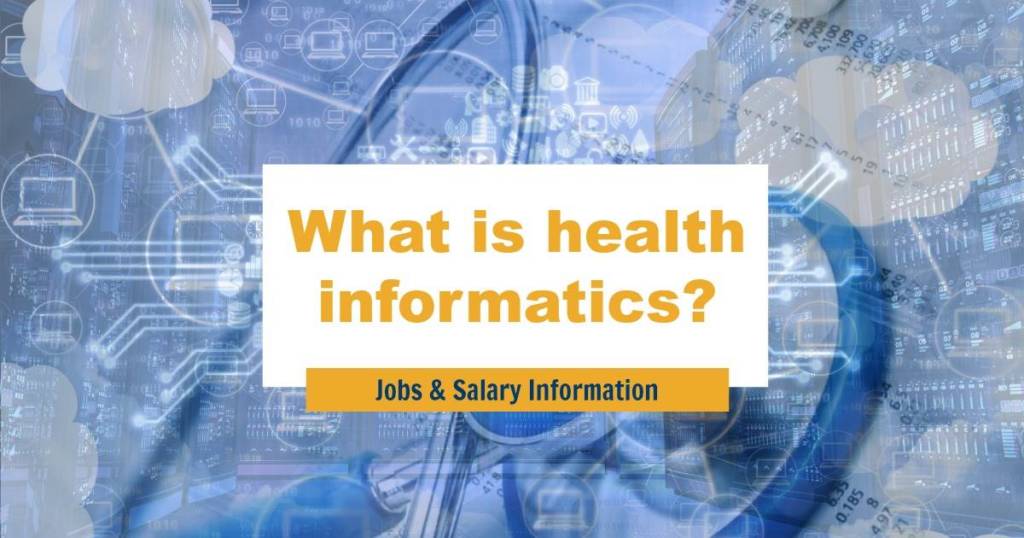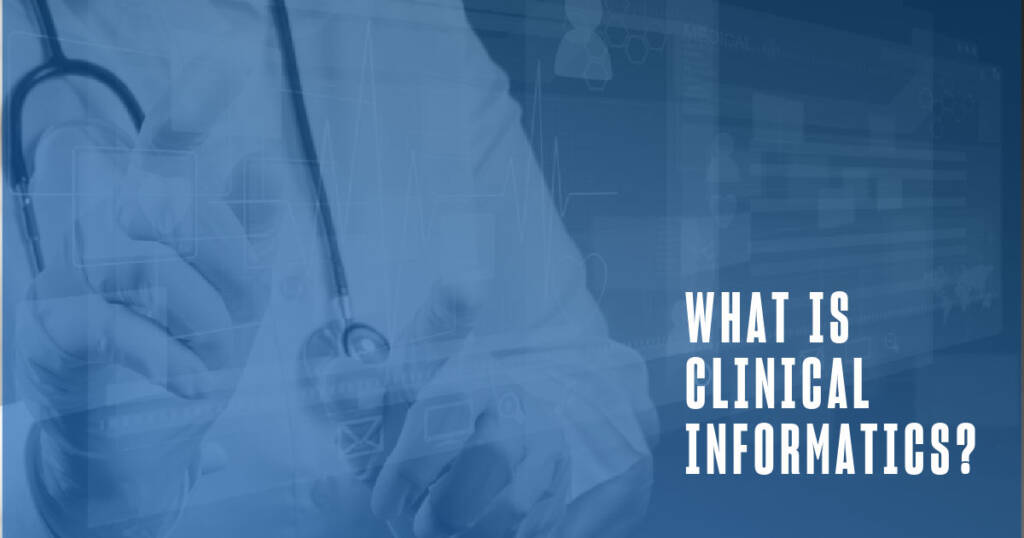The science of medical informatics is rapidly transforming the world of medicine — producing new insights for improving the quality and cost of care, new discoveries about causes and cures of disease, and new career opportunities for people interested in working in health care.
At the same time, new terminology has emerged to describe the various disciplines in which people are using cutting-edge data collection and analytics to improve the field of health care. In fact, it can even be difficult to find consensus on certain key terms. For example, what is medical informatics? And how does it differ from clinical informatics or health informatics?
So, what is medical informatics?
Well, as the vocabulary used to describe the profound implications of applying informatics to the world of medicine continues to evolve, the answer depends on whom you ask.
No less an authority than the American Medical Informatics Association (AMIA) suggests that the term has already become outdated, saying: “The informatics community typically uses the term health informatics to refer to applied research and practice of informatics across the clinical and public health domains. Medical informatics is an earlier term, no longer routinely used, outdated by the growth of bioinformatics.”
An alternative viewpoint is offered by Enrico Coiera — professor in medical informatics at Australia’s Macquarie University and author of the textbook “Guide to Health Informatics.” Acknowledging that there is some confusion around key terms, he offers a simplified definition for the complex concept of “medical informatics.”
Coiera breaks it down by first addressing the root word of “informatics,” which he describes as a discipline focused on “trying to make a difference in the way health care is delivered through the smart use of information science.”
From there, where some see confusion in the vocabulary of informatics, he sees simplicity. For example, Professor Coiera says:
Medical informatics is informatics as practiced by medical doctors.
Health informatics is more of an umbrella term that refers to informatics as practiced by everyone else across the health care landscape, including doctors.
Clinical informatics refers to informatics as practiced within a health organization, usually focusing on applications that are used by clinicians.
Nursing informatics refers to nurses who use informatics tools, systems and practices within the clinical workflow or in leadership roles.
Public health informatics, or population health informatics, refers to using information science to discover ways to improve the health of entire populations.
Biomedical informatics references applying the practice to the life sciences.
“I think the subspecialties break up naturally by either the technology that you focus on or the particular area of health care that you focus on,” said Professor Coiera, who is extremely enthusiastic about the promise shown by informatics to:
- Improve the quality of health care
- Reduce the cost of health care
- Produce life-saving insights into the health of entire populations
- Discover insights into the cause and prevention of disease
- Drive breakthroughs in designing new drugs
Health informatics professionals, according to this video from AMIA, are performing valuable work “developing ways to better understand disease and identify potential cures … from global health to personalized medicine.” A leading advocacy organization for informatics professionals, AMIA offers a library of videos and articles spotlighting the work of informatics professionals and taking a closer look at many of the ways the study of informatics is helping people live healthier lives.
Career Opportunities in Medical Informatics
In addition to its widely acknowledged potential to revolutionize the practice of health care, informatics is also one of the nation’s fastest-growing job sectors, with health care systems and other organizations (health agencies, insurance companies, software providers, academic medical centers, etc.) offering attractive salaries to professionals with the right experience and training.
Here are three medical informatics job descriptions from recent job listings on the Jobs section of LinkedIn, followed by a sampling of the many medical informatics career opportunities listed at any given time on LinkedIn and Indeed.com.
Medical Informatics Analyst, Senior
(source: LinkedIn job post, UCLA)
Work with the CMIO, Physician Informaticists and Medical Informatics Team Manager to improve quality of care delivery, regulatory efforts and population health at UCLA, and to carry out the implementation application build and/or analytics related to: clinical decision support tools (alerts, health maintenance, refill protocols, preference lists, order sets, scoring and CER rules), reporting tools (reporting workbench and dashboards), regulatory programs, clinical quality measures and/or population health efforts.
Major responsibilities include overseeing medical informatics IT project lifecycle processes related to the EHR including translating requests from clinical leadership, developing clinical workflows, directly implementing or working with builders to implement solutions, developing reports and feedback mechanisms on implementation, and monitoring and analyzing performance. Master’s degree preferred.
Informatics Specialist
(source: LinkedIn job post, Mayo Clinic)
Supports scientific projects under the supervision of a Lead Informatics Specialist or a designated senior level Informatics Specialist. Develops scripts or software applications to support data management, data extraction and data analysis as required. Is knowledgeable in the handling and in the design of repository systems to contribute to the development of internal databases. Has basic expertise in the informatics methods used to analyze data. Contributes to the design of analytical procedures and executes analytical procedures in the framework of a specific project. Contributes to the interpretation of data analysis and to writing reports. Master’s degree preferred.
Medical Informatics Manager
(source: LinkedIn job post, Blue Shield of California)
Responsible for Medical Informatics results in terms of performance, planning and approach. Develops strategy for using medical informatics to drive population health programs and strategies. Leads strategic projects related to population health technology, systems and people. Acts as a service liaison to medical groups deploying population health technology. Works with vendors to obtain and manage best-in-class products to drive population health strategy. Ensures workflow, operation, and procedures and guidelines are clearly documented and communicated. Oversees the development and implementation of new approaches and standard reporting capabilities in conjunction with the implementation of new/existing technologies. Supports Medical Informatics, quality and operational leadership in meeting strategic goals. Communicates project status, progress and outcomes to peers, stakeholders, and senior management. Master’s degree preferred.
Here is a closer look at the wide range of job listings for “medical informatics” on the Jobs section of LinkedIn:
- Biomedical Informatics Scientist (Foundation Medicine; Cambridge, Mass.)
- Medical Informatics Analyst (Blue Shield; Calif. and Mich.)
- Director of Medical Informatics (Lee Health; Florida)
- Regional Director, Medical Informatics (Fujifilm Medical Systems; Seattle)
- Informatics Product Manager (Dana-Farber Cancer Institute; Boston)
- Senior Medical Informaticist (Flatiron Health; NY)
- Home Health Quality and Informatics Coordinator (Penn Medicine, Univ. of Pennsylvania Health System)
- Biomedical Research Informatics Specialist (Ochsner Health System; New Orleans)
- Systems Analyst II, Medical Informatics (Atlantic Health System; NJ)
- Medical Informatics Manager (University of Rochester; Rochester, NY)
- Director of Clinical Informatics (HCA Healthcare; San Jose, Calif.)
- HealthCare Informatics Intern (Medical Advantage Group; Ann Arbor, Mich.)
- Chief Medical Informatics Officer (Northwood Mortgage; Baraga, Mich.)
- Clinical Informatics Transformation Specialist (UMass Memorial Medical Center; Worcester, Mass.)
- Health Informatics Applications Specialist (Boston Children’s Hospital; Boston)
- Research Informatics Business Analyst (Dana-Farber Cancer Institute; Boston)
- Senior Health Informatics Consultant (Booz Allen Hamilton; Rockville, Md.)
- Medical Informatics Programmer Analyst (Univ. of South Alabama; Mobile, Ala.)
- Lead Medical Informaticist (Cooper Univ. Health Care; Camden, NJ)
- Manager, Educational Informatics (Univ. of Wisconsin-Madison; Madison, Wisc.)
- Informatics Specialist (Mayo Clinic; Rochester, Minn.)
[RELATED] Apple, Google, Amazon: Big Tech Investing in Health Informatics >>
A search for “medical informatics $100,000” yielded hundreds of listings on the employment website Indeed.com, including:
- Senior Informatics Analyst (AETNA; Hartford, Conn.)
- Informatics UX Designer (Abbott Laboratories; Lake Forest, Ill.)
- Chief Medical Information Officer (Orange Regional Medical Center; Middletown, NY)
- Associate Chief Medical Informatics Officer – Ambulatory (Alameda Health System; San Leandro, Calif.)
- Chief Medical Informatics Officer (Northern Light Acadia Hospital; Bangor, Maine)
- Informatics Senior Lead Analyst (Cigna; Arizona)
- Radiology Informatics Software Engineer (Covera Health; New York City)
- Senior Staff Informatics Engineer (Siemens; Flanders, NJ)
In terms of career paths, medical informatics and clinical informatics are now recognized as an official medical subspecialty by the American Board of Preventive Medicine, which administers a certification exam for physicians/clinicians who apply informatics to patient care.
Those who possess clinical skills and experience and may be interested in watching this AMIA video on why board certification is important. Those who lack specific medical experience in clinical care are more likely to pursue opportunities in the broader field of health informatics.
Regarding the medical informatics career opportunities cited above, many of the upper-level positions list a master’s degree as required or preferred, and some require doctoral degrees.
[RELATED] Health Care Informatics Jobs and Salaries: What You Need to Know >>
Informatics Education and Training
The growing demand for qualified medical informatics professionals, coupled with the emphasis on advanced education for those practicing informatics within the health care field, has led to an increasing availability of graduate degree programs focused exclusively on the core principles of health informatics. Such programs can be invaluable for nurses and other clinical care providers, health information management specialists and IT professionals.
One such program is the Master of Science in Health Care Informatics offered both online and on campus at the University of San Diego. Program director Dr. Jonathan Mack says the curriculum, taught by experienced informatics practitioners, equips graduates with advanced knowledge and skills in key areas (informatics technology, clinical analytics, health care leadership, etc.) needed to pursue a wide variety of health informatics roles. The program features two specializations that allow students to develop core competencies aligned with their career interests and aspirations — Health Care Informatics or Health Care Analytics.




